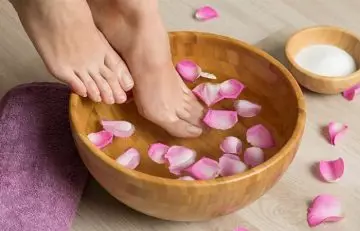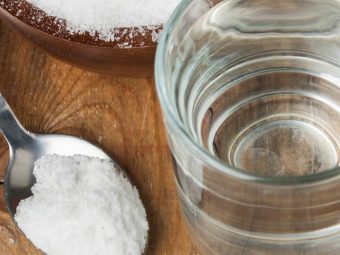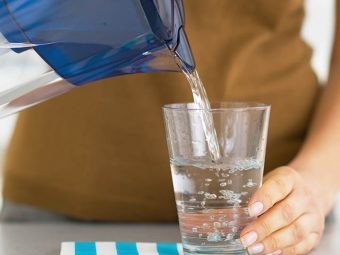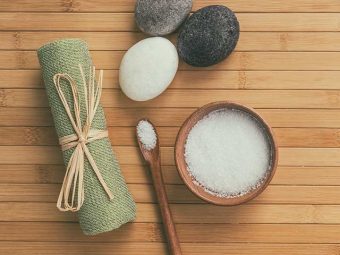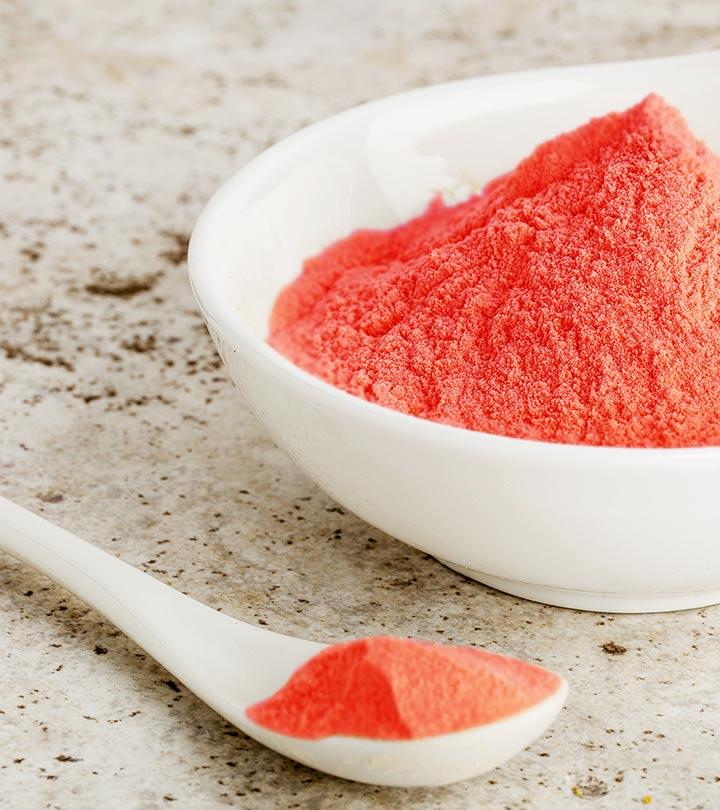7 Benefits Of Epsom Salt, How It Works, And Side Effects
From hydrating the skin to boosting hair volume, this mineral compound has a lot to offer.
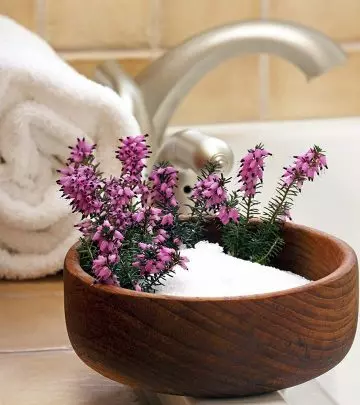
Image: Shutterstock
From treating your sore feet after a long day at work to a soothing pedicure, Epsom salt’s benefits are numerous. Epsom salt or epsomite is used for various purposes. It relieves stress instantly, effectively combats soreness and dryness of the feet, and relieves all sorts of pain. It is used in many beauty treatments for the benefits it offers. Hence, it can be termed as the star of the spa. Learn more about this bath salt in detail and also have a look at the array of benefits it offers in the article below. Keep reading!
 Know Your Ingredient: Epsom Salt
Know Your Ingredient: Epsom SaltWhat Is It?
A naturally-occurring white crystalline solid that is soluble in water.
What Are Its Benefits?
It may help relieve strained muscles and foot aches, and help relax your body to reduce stress.
Who Can Use It?
People with arthritis foot pain, anxiety, and insomnia can use this magnesium-rich salt.
How Often?
You can take an Epsom salt-infused bath every 2 to 3 days.
Caution
Pregnant or lactating women and people with heart diseases and kidney disorders should avoid using Epsom salt.
In This Article
What Is Epsom Salt?
Chemically, Epsom salt is magnesium sulfate, which breaks down in water to give magnesium and sulfate ions. These magnesium ions pass through the layers of the skin and enter your blood directly and get to work (1). That’s such an interesting shortcut, isn’t it? But what makes it different from your regular salt? Learn more about it in the next section.
Table Salt Vs. Epsom Salt
Table salt and Epsom salt are both commonly found in households but serve distinct purposes.
Table salt, or sodium chloride, is a staple seasoning in our meals. It enhances flavors and also aids in food preservation. It also plays a role in various chemical processes.
On the other hand, Epsom salt, or magnesium sulfate, is primarily used for therapeutic purposes. When dissolved in warm water, it can provide relief from muscle aches, stress, and even promote relaxation in a warm bath.
If you are curious about how exactly this therapeutic salt works, scroll down.
So How Does This Magic Salt Work?
Epsom salt is rich in magnesium ions. When the salt comes in contact with your skin, the ions pass through multiple dermal layers and reach the bloodstream. This way, there is no involvement of the GI (Gastrointestinal) tract.
It is because of this transdermal movement of magnesium that Epsom salt is used in medicine to treat hypomagnesemia (low levels of magnesium).
Where else do you think this property could be applied and used? Here you go – gardening, cookware maintenance, machines and their maintenance, aromatherapy, skin care, and beauty.
This article will talk about all of these and more – read on! Scroll through to know the Epsom salt benefits.
What Are The Benefits Of Using Epsom Salt?
1. Relieves Stress And Eases Your Body
Since your skin readily absorbs magnesium, it restores the electrolytic balance in the cells. This change in balance has a direct effect on your muscles, brain, and thereby, hormones.
These hormones could have a variety of functions like free radical scavenging, activating ion channels, etc. All in all, Epsom salt and hot water are a match made in heaven!
Recommendation
Add about two cups of Epsom salt to your hot water bath twice or thrice a week and see the change.
2. Relieves Foot Ache, Strained Muscles, And Bruises
Nothing works better than a relaxing foot soak in hot water with Epsom salt if you have a foot ache, muscle pull, or bruises.
Magnesium acts on the muscle cells to restore its levels. This boost brings about a soothing effect along with the healing. Now you know what goes into that pedicure tub!
Recommendation
Dip your feet in a tub with hot water and add 50 gram/liter of Epsom salt to it. Stay for 30-40 minutes.
Dipping your feet in salt water might not be advisable if you have wounds or blisters because of high sugar (diabetes-related). Consult your physician before using the foot soak.
Dr.Mehmet Yildiz, a scientist and a health blogger, shared his experience of using Epsom salt. He observed that adding a few spoons of it to his bath reduced his muscle pain and improved his sleep quality. He said, “I felt relaxed and had a great sense of peace with reduced muscle soreness after exercise. My recovery time was shortened (i).”
 Trivia
Trivia3. Is An Excellent Laxative
If you are sleepless due to stomach cramps and have not passed stools for over a day, you are looking at the correct page. When taken internally, Epsom salt act on the muscles to relieve the cramps.
It increases the water content in your intestines and flushes out colon waste by triggering the digestive enzymes and neurotransmitters when taken in right amounts (2).
Recommendation
Add a teaspoon of Epsom salt to a glass of water along with some lemon for best results. A hot water bath with Epsom salt will also help in curing constipation.
4. Helps In Removing Splinters And Treats Toenails Fungus And Inflammation
Splinters (shards in the skin) are one reason I hate working with wood. On countless occasions, I had to dip my hands in hot water to get rid of them. Little did I know that the water had Epsom salt in it!
Healthy magnesium levels in the body can efficiently fight inflammation as a result of injury, infection, stress, or allergies.
Recommendation
Soak the affected area in hot water with Epsom salt for about 30 minutes, thrice a week, to get rid of infection or inflammation.
5. Strengthens Hair And Boosts Hair Volume
Having a bad hair day? Or a frizzy hair week altogether? Epsom salt is your savior! To remove excess oil that is making your hair look flat and limp, use this salt along with your hair products. It gives your hair volume and bounce. It can also control the frizz and dullness of dry and damaged hair.
However, keep in mind that the magnesium in Epsom salt might react with the pigments if your hair is colored. Washing color-treated hair with Epsom salt might cause the color to fade off.
Recommendation
Add equal proportions of hair conditioner and Epsom salt (three teaspoons of each) to a bowl. Mix well and apply from the scalp to the tips. Leave it on for about 2 minutes and wash with cold water. Say hello to happy hair!
6. Exfoliates And Repairs Skin
By now, you are aware that magnesium can pass through your skin effortlessly. When applied topically, the magnesium ions interact with water and hydrate the skin. According to a study done by volunteers in 2005, skin roughness and inflammation reduced significantly when seawater rich in magnesium was used for bathing and cleansing (3).
Epsom salt thoroughly exfoliates your skin and gets rid of the accumulated dead skin patches, blackheads, tan, and cuts or infections that give rise to inflammation.
What more do you want? You found your all-in-one skin troubleshooting agent in Epsom salt – didn’t you?
7. Regulates Insulin Production And Diabetes
People with diabetes tend to lose magnesium in their urine. Low levels of magnesium make the tissues insensitive to insulin around them (4). Also, the cells fail to transport glucose to the sites where insulin is produced in the absence of magnesium and sulfate (5).
Due to these complications, glucose remains in the blood without being metabolized by insulin – worsening the situation for a person who has diabetes.
Epsom salt supplies both magnesium and sulfate in abundance to solve such issues. However, the dosage and mode of intake are crucial. Consult your doctor before using Epsom salt for this purpose.
Apart from enhancing your health, Epsom salt serves many purposes in your garden and washrooms. I’m sure you’d want to know what they are. Read on!
Epsom Salt – The Handy Troubleshooter
- A rich source of magnesium and sulfate, Epsom salt increases the fertility of soils and accelerates plant growth, making it a great fertilizer.
- Clogged washing machines? Fill the washing tub with hot water and add some Epsom salt. Run the complete wash cycle to get rid of detergent and hard water salt build-up.
- Sprinkle some Epsom salt in your garden and at entry points to keep garden pests at bay.
- Tired of scrubbing dirty bathroom tiles? Mix equal amounts of Epsom salt and detergent and use as a scrub for bright and gleaming tiles.
- Epsom salt, when sprinkled on lawns, leaves the grass fresh and green by providing necessary nourishment to the soil.
- Is your car stuck in ice sheets in the driveway? Sprinkle Epsom salt generously and watch it work!
- Epsom salt is one of the cheapest deodorants. Put a few crystals in your sweaty shoes or soak your feet in the hot salt water bath and say goodbye to odor.
How these bitter-tasting white crystals of magnesium salt gained fame is a fascinating story. Read the snippet as you scroll down.
Success Story Of Epsom Salt
Magnesium sulfate got its name from a small town in England, Epsom, in Surrey, where it was discovered. A local cowherd passing through Epsom walked across a pool of water. Thirsty cattle refused to drink water from that pool as it tasted that bitter. But, on evaporation, it had a laxative effect.
However, it was observed that this water from a natural hot spring healed the wounds of animals that waded in it.
Seeing this, people from neighboring towns started to visit Epsom to experience numerous health benefits. Years of research led to the discovery of the reason behind the healing effects of Epsom waters.
Today, Epsom salt is one of the best, cheapest, and effective cures for arthritis, sprains, cardiac irregularities, and mental disorders.
 Trivia
TriviaDidn’t you feel the urge to go buy Epsom salt right away? I’m sure going to sprinkle it on everything I see!
But am I doing it right by adding it to everything I see? Can you ingest Epsom salt? What happens if there’s an overdose? The answers are right below.
Side Effects Of Using Epsom Salt
Some Epsom salt bath side effects are:
1. Could Make Foot Wounds Worse
There are numerous Epsom salt bath benefits but stay away from Epsom salt baths or foot soaks if you have diabetes-induced foot wounds. Epsom salt bath might dry out the skin, causing irritation and aggravation of the wound.
2. Might Cause Diarrhea
Magnesium sulfate can be a harsh laxative, leading to loose motions and diarrhea. In such cases, you can switch to magnesium oxide and related salts for relief from constipation.
But if you are experiencing regular, persistent constipation, it’s time you see your doctor.
Thankfully, the occurrence of these side effects is very rare. It is safe to use Epsom salt in fixed, small doses to reap its benefits. So, what is the recommended dose? Let’s find out!
How To Use Epsom Salt And How Much Is Recommended?
The recommended doses are:
Foot Soak: ½ cup of Epsom salt + a basin full of hot water
Hot Water Bath: 2 cups + a bathtub with hot water
Read on for tried and tested Epsom salt recipes for your soul!
1. The Soothing Body Bath
What You Need
- 2 cups of Epsom salt (pure, bath grade)
- Regular body wash (Do not use bath soaps as they might react with the salts.)
What You Need To Do
- Draw your bath with warm to hot water. If you are using a bucket, fill it up with tolerable warm to hot water. Arrange enough water for a complete body wash.
- Add two cups of Epsom salt to the bath. Let it dissolve and settle for 2 minutes.
- Slowly sink into this heaven and soak for 10 minutes.
- For an added moisturizing effect, add a few drops of olive oil or baby oil to your bath.
- Wash and feel the difference!
2. The Rejuvenating Footbath
What You Need
- ½ cup of Epsom salt (pure, bath grade)
- A pedicure tub or a regular basin (your feet should be dipped fully)
- Pumice stone (optional)
What You Need To Do
- Fill your pedicure tub or regular basin with warm-hot water.
- Add half a cup of Epsom salt to it. Let it dissolve.
- Dip your tired, injured feet in the tub. Sit back and relax for 20 minutes.
- Scrub and peel off the dead skin with a pumice stone, if needed.
3. The Magical Magnesium ‘Oil’
If you don’t prefer using salt crystals in your bath, you can try using magnesium oil, extracted from Epsom salt. Ironically, it doesn’t have oil and is only concentrated magnesium sulfate solution, which gives you a greasy afterfeel.
What You Need
- ½ cup filtered water (Do not use hard water)
- ½ cup Epsom salt flakes
What You Need To Do
- Bring the filtered water to a boil in a non-aluminum saucepan. Switch off the flame/heat.
- Add Epsom salt flakes and stir to dissolve them.
- Let the solution cool down. Transfer it to a bottle and store at room temperature.
- Use it topically on your skin. It might first give a tingling-stinging sensation, which subsides with time.
Infographic: Who Should Avoid Using Epsom Salt?
From relieving stress to strengthening hair volume, Epsom salt has many benefits. However, this salt isn’t suitable for everyone, and its excessive consumption may have some side effects. Check out the infographic below to learn who should avoid using Epsom salt. Illustration: StyleCraze Design Team
Epsom salt uses are uncountable and it is beneficial in numerous ways. Its magnesium ions can relieve stress and ease the body. Epsom salt also relieves foot aches, bruises, and strained muscles. It works as an excellent laxative. It can also remove splinters and help treat toenail fungus. It helps fight inflammation, strengthens hair, boosts hair volume, acts as an exfoliating agent, and helps repair the skin. However, Epsom salt has also been reported to aggravate wounds and trigger diarrhea in some cases. Hence, caution is advised. Try including Epsom salt in your beauty regime to reap the benefits it offers.
Frequently Asked Questions
Can Epsom salt be used to cure arthritis?
Yes. Epsom salt can heal arthritis, which is another inflammatory disease. In fact, Epsom salt provides relief to inflammation caused due to various reasons – bacterial infections (cellulitis), athlete’s foot, simple cuts and bruises, etc. – by providing magnesium that, in turn, reduces the C-reactive protein (CRP) production. CRP is a marker for inflammation in the body. Higher the magnesium, lower the CRP levels.
What are the alternatives to Epsom salt?
Sea salt is a safe substitute for Epsom salt in foot soaks or baths. You can also use oatmeal, apple cider vinegar, or essential oils to condition and pamper your skin, scalp, and feet.
Can you ingest/eat Epsom salt?
Oral intake of Epsom salt is rarely prescribed. It has drastic side effects due to the sudden gush of magnesium in the blood. That’s why you have to take a lot of fluids while doing this.
One dose can be dissolved in about 200 mL (8 oz.) of water for immediate consumption under the strict guidance of your physician.
Does Epsom salt help to improve sleep?
In a study, it was found that magnesium deficiency can lead to sleep disorders due to the reduction of melatonin secretion. In other words, the high magnesium content in Epsom salt may be able to help improve sleep (6).
Can Epsom salt be used for treating specific medical conditions such as headaches?
Epsom salt may help relieve symptoms of headaches and migraines by providing relief to the muscles around the skull.
How can Epsom salt be used to treat colds, flu, and other infections?
When used in a tub of hot water, It works as an antitoxin that helps remove toxins from the body and speeds up the healing process.
Are there any drug interactions to be aware of when using Epsom salt?
Avoid taking any other medications orally when consuming Epsom salt. You can take any of your prescribed medications after 2 hours for it to be absorbed by your body.
Is Epsom salt safe for long-term use or should it only be used occasionally?
As a laxative, use it occasionally. For muscle aches and sores, soak in an Epsom salt bath for at least 15 mins. Be mindful of how much Epsom salt for the bath you are using.
Is Epsom salt safe to use during pregnancy?
The benefits of Epsom salt bath are uncountable. Epsom salt bath is safe during pregnancy but avoid overheating your body as it can cause complications. Do not consume Epsom salt in excess to prevent poisoning or an overdose.
Is Epsom salt safe for people with sensitive skin?
It can soothe certain skin conditions such as eczema and psoriasis but might aggravate other skin conditions, depending on your skin type. Consult a doctor before using Epsom salt.
Key Takeaways
- Epsom salt reduces inflammation and relieves muscle pain.
- It improves cardiovascular health, detoxifies the body, and manages skin diseases, such as eczema, psoriasis, and dry skin.
- It also helps relieve constipation.
- It reduces stress, and enhances sleep.
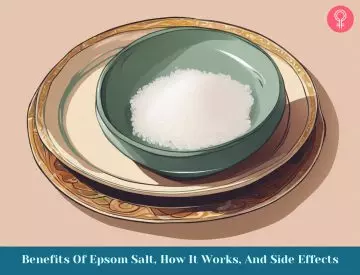
Image: Stable Diffusion/StyleCraze Design Team
Discover the amazing health benefits of Epsom salt! Watch this helpful video to learn how it can help reduce stress, improve sleep, and even relieve muscle pain.
Personal Experience: Source
StyleCraze's articles are interwoven with authentic personal narratives that provide depth and resonance to our content. Below are the sources of the personal accounts referenced in this article.
i. Here’s How to Benefit from Epsom Saltshttps://medium.com/sensible-biohacking-transhumanism/how-to-benefit-from-epsom-salts-b80de14f79fd
References
Articles on StyleCraze are backed by verified information from peer-reviewed and academic research papers, reputed organizations, research institutions, and medical associations to ensure accuracy and relevance. Read our editorial policy to learn more.
- “Myth or Reality-Transdermal” US National Library of Medicine, Nutrients
- “Medical Management of Consti…” Clinics in Colon and Rectal Surgery
- “Bathing in Magnesium-rich sea salt…” International Journal of Dermatology, US National Library of Medicine
- “Magnesium and glucose metabolism” US National Library of Medicine
- “Implications of magnesium deficiency..” Biological Trace Elements Research, US National Library of Medicine.
- “The effect of magnesium supplementation on primary insomnia in elderly: A double-blind placebo-controlled clinical trial.” Journal of Research in Medical Sciences










